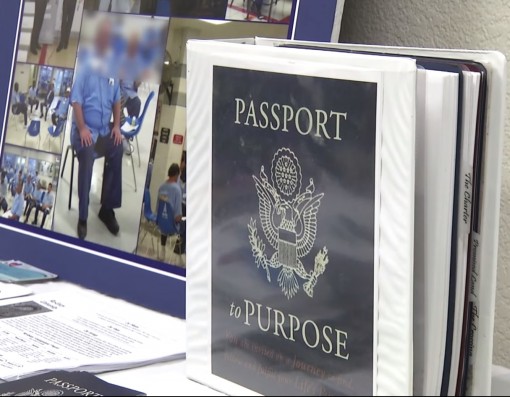Graduates earn certificates to be substance abuse counselors
Editor’s note: Inside CDCR takes a closer look at the Offender Mentor Certification Program.
People helping people and making positive difference in others’ lives is exactly what’s happening inside CDCR.
Avenal State Prison and Central California Women’s Facility inmates, many facing life sentences, are changing their lives while learning how to effect change by counseling others.
The Offender Mentor Certification Program (OMCP) gives selected inmates an opportunity to become licensed substance abuse treatment counselors, which often leads to counseling jobs once they leave prison.
Offender Mentor Certification helps get to the heart of the problem
“(The inmates) have deep-rooted issues,” said Sol Irving, a retired Correctional Counselor III who initially founded the program at California State Prison-Solano in 2009. “Not only are you dealing with substance abuse but you’re dealing with self-esteem, you’re dealing with denial management, and character building.”
The OMCP is a voluntary program for long- and life-term inmates who complete a closely supervised 4,000-hour counseling internship in an in-prison substance abuse treatment program. In addition, each participant must successfully pass the Counselor Certification written examination, currently provided through California Association of Alcohol and Drug Abuse Counselors.
The certification isn’t just for the prison, as it is also recognized by the Department of Health Care Services.
Once inmates graduate from this program, they are assigned as inmate mentors at the substance abuse treatment programs within CDCR’s Reentry Hub facilities.
The primary goal of the OMCP is to teach inmates the skills they need to work alongside certified contracted drug and alcohol counselors. So this means they can provide enhanced treatment services to other inmates assigned to substance abuse treatment programs.
There are currently inmates serving as certified drug and alcohol abuse addiction counselors at the following prisons:
- Avenal State Prison
- California Correctional Institution in Tehachapi
- California Men’s Colony in San Luis Obispo
- Chuckawalla Valley State Prison in Blythe
- California Rehabilitation Center in Norco
- Correctional Training Facility in Soledad
- Substance Abuse Treatment Center and State Prison, Corcoran
- California State Prison-Solano
- Central California Women’s Facility in Chowchilla
- California Institution for Women in Corona
Offender Mentor Certification helps transition into community
After completing the program, many offenders have found success on the outside.
“The inmates who paroled who are certified, a large majority of them are employed as counselors in private agencies. And, some of them are running the agencies now,” Irving said.
Program graduates Al Roensch and Rob Moore recently spoke at a gathering to discuss reentry services. In the audience were state and local law enforcement representatives, judges, and community treatment providers. Reentry services focus on helping offenders transition from incarceration back into the community. Services include housing, treatment, counseling, employment assistance, and child care.
“While I was in Solano I got my Bachelor’s degree in Psychology and that wouldn’t have happened had I not gotten into the Offender Mentor Certification Program,” Roensch said.
“It’s not just about this recovery thing…it’s about a new way of living,” Moore said.
In 2009, the pair were part of the first group selected for the program.
Self improvement
The first step is to get inmates in the program to recognize their own issues and work on them.
“We went through the parallel process. So, that means you can’t (help others) if you haven’t addressed your own self,” Roensch said
Roensch, who was released in July 2013 after serving 17 years in prison, is currently working, all while finishing his parole. After that he plans on working as a substance abuse treatment counselor in the community.
“From where I was and who I used to be, good things are coming,” he said.
After his release from prison three years ago, Moore earned a Master’s degree in Social Work. Meanwhile, he is also a doctorate candidate.
“What I know about the person I am now is that I like this person and hopefully I’m helping people,” Moore said.
By Dana Simas, OPEC Public Information Officer
Additional content
- See the YouTube video by Jeff Baur, CDCR TV Specialist.
- Learn more about the Offender Mentor Certification Program.
Read more rehabilitation stories.
Follow CDCR on YouTube, Facebook, X (formerly Twitter). Listen to the CDCR Unlocked podcast.
